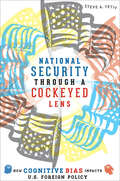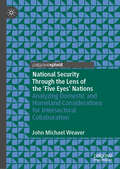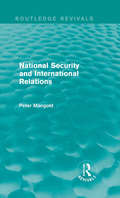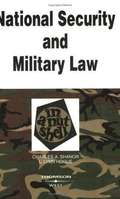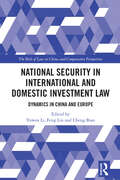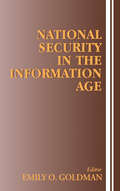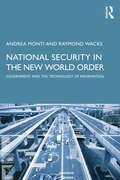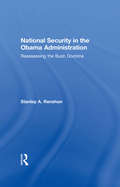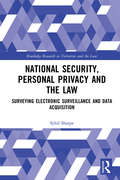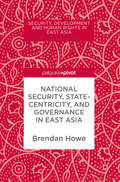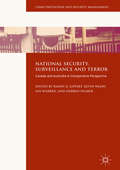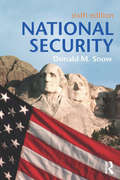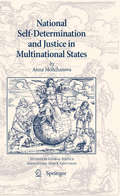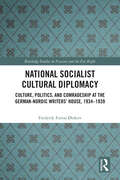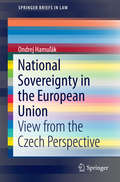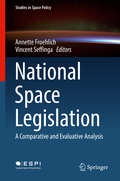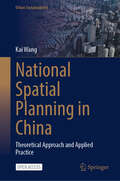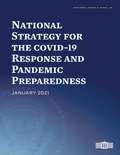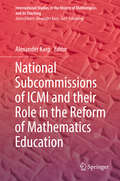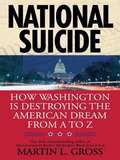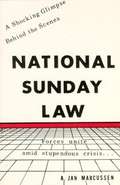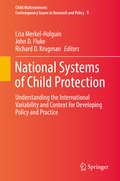- Table View
- List View
National Security Through a Cockeyed Lens: How Cognitive Bias Impacts U.S. Foreign Policy
by Steve A. YetivA study examining how poor decision-making based on mental errors or cognitive biases hurts American foreign policy and national security.Author Steve A. Yetiv draws on four decades of psychological, historical, and political science research on cognitive biases to illuminate some of the key pitfalls in our leaders’ decision-making processes and some of the mental errors we make in perceiving ourselves and the world.Tracing five U.S. national security episodes?the 1979 Soviet invasion and occupation of Afghanistan; the Iran-Contra affair during the Reagan administration; the rise of al-Qaeda, leading to the 9/11 attacks; the 2003 U.S. invasion of Iraq; and the development of U.S. energy policy?Yetiv reveals how a dozen cognitive biases have been more influential in impacting U.S. national security than commonly believed or understood.Identifying a primary bias in each episode?disconnect of perception versus reality, tunnel vision (“focus feature”), distorted perception (“cockeyed lens”), overconfidence, and short-term thinking?Yetiv explains how each bias drove the decision-making process and what the outcomes were for the various actors. His concluding chapter examines a range of debiasing techniques, exploring how they can improve decision making.Praise for National Security through a Cockeyed Lens“Yetiv’s volume could be one of the key books for presidents and their advisers to read before they begin making decisions.” —William W. Newmann, H-Diplo“The principles in this book deserve wide recognition. Yetiv places necessary focus on lapses in decision making that are important to acknowledge.” —James Lebovic, Political Science Quarterly
National Security Through the Lens of the ‘Five Eyes’ Nations: Analyzing Domestic and Homeland Considerations for Intersectoral Collaboration
by John Michael WeaverThis book analyzes the ‘Five Eyes’ nations’ concerns and policies relating to national security threats through an interdisciplinary theoretical engagement with the Political, Information, Security and Economic (PISE) Model. Through the analysis of secondary data sources such as scholarly and government reports, policy documents, press releases and interviews, the author analyzes the five case studies—Australia, Canada, New Zealand, UK, and the USA—to determine how and why nations use the PISE variables to shape favorable homeland security outcomes, to determine what the points of homeland intersectoral collaboration are among the ‘Five Eyes’ nations. In so doing, Weaver determines that although the ‘Five Eyes’ countries have concerns about homeland security and each, individually, identifies threats and hazards, they do also employ collaborative measures to build resilience and increase efforts to prepare for anticipated security breaches.
National Security and International Relations (Routledge Revivals)
by Peter MangoldFirst published in 1990, National Security and International Relations provides a concise analysis of the problem of national security in the twentieth century. It examines the criteria by which states decide what level of security they want to seek in an uncertain and essentially Hobbesian world, and why some states tend to underinsure, while obsessively insecure states overinsure, frequently making others more insecure in the process. In the wake of two world wars and the threat of nuclear destruction, Peter Mangold argues that war was becoming as much a source of insecurity as the intentions of other states. It then explores the different approaches attempted during the twentieth century to ameliorate or ideally escape from the security dilemma. These range from international regimes, to the restructuring of the international politics of Western Europe so as to substitute cooperation for conflict, and U.S. and Soviet attempts to render nuclear competition safer through arms control and confidence building measures. Of special value to students of International Relations and Strategic Studies, this book will also interest those keen to understand the challenges embodied in Gorbachev’s ‘new thinking’ in foreign policy.
National Security and Military Law in a Nutshell
by Charles A. Shanor L. Lynn HogueThis book provides authoritative coverage of the Constitution and national security, entering the military, and service members' rights. Text also discusses the military criminal justice system, discharge, and compensation for injury or death. An ideal overview for practitioners, law students in specialized courses, cadets at military academies or in college ROTC programs, and lawyers preparing to enter the Judge Advocate General's Corps.
National Security in International and Domestic Investment Law: Dynamics in China and Europe (The Rule of Law in China and Comparative Perspectives)
by Feng Lin Yuwen Li Cheng BianThis book offers a dynamic introduction to the new developments on national security review of foreign direct investment (FDI) from the perspectives of both domestic law and international investment law. COVID-19 and the Russian invasion of Ukraine have intensified FDI screening to an unprecedented scale, yet its purposes, scope and potential impact remain ambiguous and controversial. The book first attests the legitimacy of FDI screening by using the theory of National Security Constitution. Part I explicates the national security, public order and public health exceptions clauses in international investment law and the novel EU Regulation on FDI screening. Part II provides an in-depth analysis of FDI screening in China, France, Germany, Italy, the Netherlands, Poland and the UK, which have either witnessed momentous changes in domestic law recently or have adopted new laws to cope with the growing security concerns. The book illustrates how States and the EU are using legal instruments to tackle exigent and emerging challenges and the complexity of national security emanated from foreign investment, in the context of evolving disruptive digital technologies and the structural change of the global economy. The volume will be of great value to a wide range of audiences including academics in investment and trade law, legal practitioners, in-house counsels, policymakers, business professionals and law and business students at the graduate level.
National Security in the Information Age
by Emily O. GoldmanAs the activities of individuals, organizations, and nations increasingly occur in cyberspace, the security of those activities is becoming a growing concern. Political, economic and military leaders must manage and reduce the level of risk associated with threats from hostile states, malevolent nonstate actors such as organized terrorist groups or individual hackers, and high-tech accidents. The impact of the information technology revolution on warfare, global stability, governance, and even the meaning of existing security constructs like deterrence is significant. These essays examine the ways in which the information technology revolution has affected the logic of deterrence and crisis management, definitions of peace and war, democratic constraints on conflict, the conduct of and military organization for war, and the growing role of the private sector in providing security.
National Security in the New World Order: Government and the Technology of Information
by Raymond Wacks Andrea MontiThis important new book explores contemporary concerns about the protection of national security. It examines the role, influence, and impact of Big Tech on politics, power, and individual rights. The volume considers the manner in which digital technology and its business models have shaped public policy and charts its future course. In this vital text for legislators and policymakers, Andrea Monti and Raymond Wacks draw on several case studies to analyse the changing nature of national security and revisit the traditional idea of the sovereignty of the State. They highlight some of the limitations of the conventional understanding of public policy, national security, and the rule of law to reveal the role of digital technology as an enabler as well as discriminator in governance and social disorder. Further, the chapters in the book explore the tenuous balance between individual freedom and national security; the key role of data protection in safeguarding digital data; Big Tech’s appropriation of national security policy; the debate relating to datagathering technologies and encryption; and offers an unsettling answer to the question ‘what is a leak?’ A stimulating read, this key text will be of immense interest to scholars of politics, cyberculture, and national security, as well as to policy analysts, lawyers, and journalists.
National Security in the Obama Administration: Reassessing the Bush Doctrine
by Stanley A. RenshonThe Bush Doctrine is dead! At least that's what critics hope. But while new U.S. national security challenges emerge, many post-9/11 threats still persist and the policies of George W. Bush offer one set of strategic answers for how President Obama can confront those dangers. Neither a polemic nor a whitewash, this book provides a careful analysis of the Bush Doctrine--its development, application, and rationale--and assesses its legacy: How will Obama respond to the many foreign policy challenges that await him? Through an examination of psychology as much as policy, Renshon gives us the first comparative analysis of the Bush Doctrine and the developing Obama Doctrine. The book analyzes the range of national security issues Obama will face and the political divisions that permeate U.S. national security debates. It is essential reading for anyone looking to understand how presidents assess security risks generally and how Obama specifically is likely to adapt the Bush Doctrine to his own worldview.
National Security through a Cockeyed Lens: How Cognitive Bias Impacts U.S. Foreign Policy
by Steve A. YetivHow poor decision making hurts U.S. national security."How do mental errors or cognitive biases undermine good decision making?" This is the question Steve A. Yetiv takes up in his latest foreign policy study, National Security through a Cockeyed Lens.Yetiv draws on four decades of psychological, historical, and political science research on cognitive biases to illuminate some of the key pitfalls in our leaders’ decision-making processes and some of the mental errors we make in perceiving ourselves and the world.Tracing five U.S. national security episodes—the 1979 Soviet invasion and occupation of Afghanistan; the Iran-Contra affair during the Reagan administration; the rise of al-Qaeda, leading to the 9/11 attacks; the 2003 U.S. invasion of Iraq; and the development of U.S. energy policy—Yetiv reveals how a dozen cognitive biases have been more influential in impacting U.S. national security than commonly believed or understood. Identifying a primary bias in each episode—disconnect of perception versus reality, tunnel vision ("focus feature"), distorted perception ("cockeyed lens"), overconfidence, and short-term thinking—Yetiv explains how each bias drove the decision-making process and what the outcomes were for the various actors. His concluding chapter examines a range of debiasing techniques, exploring how they can improve decision making.
National Security under the Obama Administration
by Bahram M. Rajaee Mark J. MillerAn initial assessment of President Obama's foreign and national security policy, this volume brings together a unique collection of American and non-American scholars to examine various institutional, regional, and major policy dimensions of contemporary US engagement with the world. All contributors have been associated with a series of US foreign and national security policy institutes convened at the University of Delaware, made possible by grants received from the US Department of State and through the generosity of the University of Delaware's Institute for Global Studies. The contributions reflect the constructive dialogue nurtured throughout the institutes.
National Security, Personal Privacy and the Law: Surveying Electronic Surveillance and Data Acquisition (Routledge Research in Terrorism and the Law)
by Sybil SharpeThere have been significant changes in public attitudes towards surveillance in the last few years as a consequence of the Snowden disclosures and the Cambridge Analytica scandal. This book re-evaluates competing arguments between national security and personal privacy. The increased assimilation between the investigatory powers of the intelligence services and the police and revelations of unauthorised surveillance have resulted in increased demands for transparency in information gathering and for greater control of personal data. Recent legal reforms have attempted to limit the risks to freedom of association and expression associated with electronic surveillance. This book looks at the background to recent reforms and explains how courts and the legislature are attempting to effect a balance between security and personal liberty within a social contract. It asks what drives public concern when other aspects seem to be less contentious. In view of our apparent willingness to post on social media and engage in online commerce, it considers if we are truly consenting to a loss of privacy and how this reconciles with concerns about state surveillance.
National Security, Statecentricity, and Governance in East Asia
by Brendan HoweThis book assesses the extent to which an emphasis on national security and prioritization of state interests has dominated governance policy-making in Northeast and Southeast Asia, at the expense of human security, human development, and human rights. The findings are that in many cases, there are embedded structural obstacles to achieving human-centered governance objectives in the region. These relate to the role of the military, historical authoritarian legacies, and new authoritarian trends. Contributors examine not only the most obvious instances of military domination of governance in the region (North Korea with its "Military First" philosophy, Thailand since the 2014 coup, and Myanmar with its long history of military rule), but also less well known examples of the influence of conflict legacies upon governance in Cambodia, Timor-Leste, and Laos, as well as the emergence of new reservoirs of power and resources for the forces of authoritarianism.
National Security, Surveillance and Terror: Canada And Australia In Comparative Perspective (Crime Prevention and Security Management)
by Kevin Walby Randy K. Lippert Ian Warren Darren PalmerThis volume investigates and raises conceptual questions about the relationships between governments, police and security agencies, and citizens in two major western jurisdictions: Canada & Australia. Many debates that concern these topics are dominated by US and UK perspectives, and this volume acknowledges that. However, it also provides an analysis of national security and surveillance practices that are legitimated through rhetorical reference to terror policing, a continuous state or readiness. Contributors are leading scholars studying national security, surveillance and related issues of risk, border security, terror, and sovereignty. National Security, Surveillance and Terror is a significant new addition to this field of study because it provides a view of national security practices that challenges unquestioned dichotomies in this field. It highlights the complexity of national security and the practices it entails, including surveillance. Furthermore, this book questions approaches to national security, surveillance, and terror in relation to demands for accountability, transparency, privacy, and legitimacy. A well-researched and engaging volume, this book will be of interest to scholars of global criminology, policing, and justice studies.
National Security: Defense Policy For A New International Order
by Donald M. SnowThis text analyzes the history, evolution, and processes of national security policies. It examines national security from two fundamental fault lines--the end of the Cold War and the evolution of contemporary terrorism, dating from the 9/11 terrorist attacks and tracing their path up to the Islamic State (ISIS) and beyond. The book considers how the resulting era of globalization and geopolitics guides policy. Placing these trends in conceptual and historical context and following them through military, semi-military, and non-military concerns, National Security treats its subject as a nuanced and subtle phenomenon that encompasses everything from the global to the individual with the nation at its core. New to the Sixth Edition Fully updated with expanded coverage of ISIS, the "new cool war" with Russia, cybersecurity challenges, natural resource wars and development, negotiations with Iran, border threats, and much more. Includes a completely new chapter on "lethal landscapes" such as developing world international conflicts in Africa, Asia, and the Middle East; the "siren song" of the Islamic State; and the dilemmas of guns, butter, and boots on the ground. Shifts the focus from globalization to a more widely-ranging look at security, from the individual level to the regional to the global.
National Self-Determination and Justice in Multinational States
by Anna MoltchanovaSubstate nationalism, especially in the past fifteen years, has noticeably affected the political and territorial stability of many countries, both democratic and democratizing. Norms exist to limit the behavior of collective agents in relation to individuals; the set of universally accepted human rights provides a basic framework. There is a lacuna in international law, however, in the regulation of the behavior of groups toward other groups, with the exception of relations among states. The book offers a normative approach to moderate minority nationalism that treats minorities and majorities in multinational states justly and argues for the differentiation of group rights based on how group agents are constituted. It argues that group agency requires a shared set of beliefs concerning membership and the social ontology it offers ensures that group rights can be aligned with individual rights. It formulates a set of principles that, if adopted, would aid conflict resolution in multinational states. The book pays special attention to national self-determination in transitional societies. The book is intended for everyone in political philosophy and political science interested in global justice and international law and legal practitioners interested in normative issues and group rights
National Socialist Cultural Diplomacy: Culture, Politics, and Comradeship at the German-Nordic Writers’ House, 1934–1939 (Routledge Studies in Fascism and the Far Right)
by Frederik Forrai ØrskovNational Socialist Cultural Diplomacy provides the first comprehensive account of the German-Nordic Writers’ House. From 1934 to 1939, young Scandinavian and Finnish writers spent summers at a seaside villa in Travemünde, mingling with representatives of the “new German literature,” to enjoy beach days, excursions in the Third Reich, and evening discussions on literature, politics, and comradeship. The book treats the Writers’ House as a case study of National Socialist cultural diplomacy, offering fresh insights on the ways in which semi-official cultural mediators addressed, navigated, and were constrained by a dilemma central to all cultural diplomacy, but more urgently so in the case of totalitarian regimes like the Third Reich: that in order to be perceived as legitimate, culture cannot be too obviously circumscribed by politics, while cultural autonomy comes with a lack of control that does not sit well with totalitarian regimes.Between the prevalent ideal in the Nordic cultural sphere that culture stands apart from politics, on the one hand, and the political aims of official German diplomacy, on the other, the institution showcases the constraints faced by aspiring cultural diplomats in the Third Reich and the strategies with which the Writers’ House’s organizers addressed them. With the Writers’ House as a prism, National Socialist Cultural Diplomacy also offers a case study of the fault lines that emerged in the Nordic literary sphere with the post-1933 ideologization of the German literary field, its institutions, and its lucrative book market. At stake was the role and identity of the literary intellectual, the proper relationship between culture, economics, and politics, and—for some of the visiting writers—whether to place consciousness over comradeship. This book will be of interest to researchers of Nazism, social and cultural history, and the history of the extreme right.
National Sovereignty in the European Union: View from the Czech Perspective (SpringerBriefs in Law)
by Ondrej HamuľákThis volume assesses the implications of membership in the European Union for countries’ understanding of the concept of sovereignty, based on the perspective of the Czech Republic. The starting point of this work is acceptance of the Czech Republic’s membership in the European Union as a basic fact. The goal of the analysis presented here is to offer a theoretical approach to reconciling state sovereignty with the participation of the Czech Republic in the European integration project. To do so, the book pursues an in-depth analysis of the reactions of the Constitutional Court of the Czech Republic to the challenges associated with membership in the EU. Above all, it addresses the following two basic research questions:1. Is membership of the state in the European Union associated with a loss of sovereignty, a sharing of sovereignty, or does it have no real consequences for the scope or understanding of the concept of state sovereignty, such that the phenomenon remains a classical, static and defining element of the state?2. How does the Czech Constitutional Court deal with the specific characteristics of European Union law and what is its stance on the nature of the relationship between supranational and national law?
National Space Legislation: A Comparative and Evaluative Analysis (Studies in Space Policy #15)
by Annette Froehlich Vincent SeffingaThis book provides a unique in-depth comparative and evaluative analysis based upon primary sources. Therefore, it does not only provide a more complete understanding of the subject compared to other publications but, because it provides a full perspective, can also serve as a basis for further research. The interest in national space legislation, and the importance thereof to regulating space activities conducted by private entities, gives a clear incentive to conduct a comparative analysis of the national space legislation of various states. The purpose of this report is to provide such a comparative analysis that will detail the similarities and differences between the national space laws of selected states with a focus on European comprehensive national space legislation. The states discussed are: Sweden, the United Kingdom, Australia, China, Belgium, the Netherlands, France, Austria, Indonesia, Denmark, New Zealand and Luxembourg. This report is intended to assist the efforts of states that are seeking to enact or revise national space legislation not only by presenting the approaches taken by other states, but also by presenting, as far as possible, the rationale behind their approaches. The readership of this book consists of academics and professionals in space law and can further assist policymakers wishing to revise or enact national space legislation.
National Spatial Planning in China: Theoretical Approach and Applied Practice (Urban Sustainability)
by Kai WangThis open access book conducts systematic and comprehensive research on urban spatial development problems in China from territorial perspectives, based on the scientific theory on human settlements environment. By integrating the theories of globalization, spatial planning, state intervention, and beyond, the author systematically sorts out both domestic and foreign urban spatial planning theories at national levels. Moreover, population, industries, natural resources, ecological environments, and management mechanisms involved during the urbanization and urban development process were analyzed in order to propose the theory and methods of national spatial planning. This book is recommended for researchers and practitioners in the fields of human settlement environment, urban, and regional planning; graduate students as well as teachers of urban planning, geography, architecture, regional science, and other related majors in universities, and public officials.
National Strategy for the COVID-19 Response and Pandemic Preparedness: January 2021
by Joseph R. Biden, Jr.The ultimate guide for anyone wondering how President Joe Biden will respond to the COVID-19 pandemic—all his plans, goals, and executive orders in response to the coronavirus crisis. Shortly after being inaugurated as the 46th President of the United States, Joe Biden and his administration released this 200 page guide detailing his plans to respond to the coronavirus pandemic. The National Strategy for the COVID-19 Response and Pandemic Preparedness breaks down seven crucial goals of President Joe Biden's administration with regards to the coronavirus pandemic: 1. Restore trust with the American people. 2. Mount a safe, effective, and comprehensive vaccination campaign. 3. Mitigate spread through expanding masking, testing, data, treatments, health care workforce, and clear public health standards. 4. Immediately expand emergency relief and exercise the Defense Production Act. 5. Safely reopen schools, businesses, and travel while protecting workers. 6. Protect those most at risk and advance equity, including across racial, ethnic and rural/urban lines. 7. Restore U.S. leadership globally and build better preparedness for future threats. Each of these goals are explained and detailed in the book, with evidence about the current circumstances and how we got here, as well as plans and concrete steps to achieve each goal. Also included is the full text of the many Executive Orders that will be issued by President Biden to achieve each of these goals. The National Strategy for the COVID-19 Response and Pandemic Preparedness is required reading for anyone interested in or concerned about the COVID-19 pandemic and its effects on American society.
National Subcommissions of ICMI and their Role in the Reform of Mathematics Education (International Studies in the History of Mathematics and its Teaching)
by Alexander KarpICMI (or IMUK) was founded in 1908 and initiated the establishment of national subcommissions to launch national activities in response to the IMUK agenda and to promote the reform proposals within each member country.While ICMI’s activities were thoroughly studied, the activities of the national subcommissions are studied only very marginally. In the meantime, their work has been of major importance – both because of their role in exploring and documenting the development of mathematics education at the beginning of the 20th century, and because of the changes and new ideas which they brought to their countries. Importantly, even if some results of their activities were analyzed within their countries in the corresponding languages, almost nothing is known internationally. This book is planned to deepen our knowledge on at least some of the national subcommissions. The book will interest both researchers and others interested in mathematics education and its development.
National Suicide
by Martin L. GrossThe New York Times bestselling author of The Government Racket is back with a scathing indictment of government waste. The government of the United States is a juggernaut of mismanagement, malfeasance and incompetence. Despite the strong foundation laid down by the founding fathers, it is headed to extinction. From the Alternative Minimum Tax to Zip Codes, New York Times bestselling author Martin L. Gross outlines the programs that have exploded financially, the laws that had completely unintended consequences, and the scams perpetrated by legislators intent upon remaining in office no matter what the cost to the nation?and its citizens.
National Sunday Law
by A. Jan MarcussenNational Sunday Law explains exactly who the beast is, what the image of the beast is, and what the mark of the beast is. <P><P>A fascinating book and a must for anyone in search of the truth. National Sunday Law is a small paperback book with less than 100 pages and medium size print, a very quick read. <P><P>National Sunday Law was first published in 1983 and is now in its 110th printing with 36.8 million in print.
National Systems of Child Protection: Understanding the International Variability and Context for Developing Policy and Practice (Child Maltreatment #8)
by Richard D. Krugman Lisa Merkel-Holguin John D. FlukeThis volume provides a wide spectrum description analysis of the contemporary and well established child protection systems in a range of countries, such as Australia, Canada, Netherlands and Spain. It presents a brief orientation about the public and private systems involved in protecting children in each country. Further the book identifies current key policy and implementation drivers that orient the systems of child protection, such as children’s rights, family preservation, use of evidence and public health orientation. Finally it presents a critical analysis of the strengths and limitations of the systems, as well as, strategies for prospects for improving outcomes for children and their families.
National Taxation for Property Management and Valuation
by A Macleary A. MaclearyA clear and up-to-date guide to the UK tax system for surveyors and valuers which demonstrates land valuation for taxation purposes.
